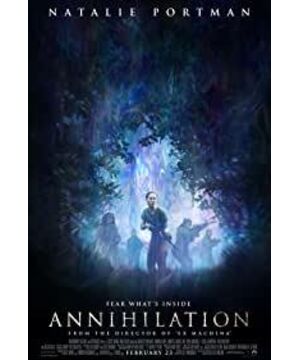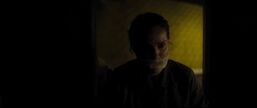"Annihilation" is a science fiction story about creatures and genes, which is slightly different from the "Third Contact" science fiction movies that audiences are used to understanding in the past. As Lena and her team made their way to the destination "Lighthouse", the more they discovered the genetic chaos in this space. Elements such as people, animals, plants, water, stone and soil are "refracted" in this space, and cells and molecules are divided and fused at an unreasonable speed. The entire five-member team is explored in the "unknown". The team members gradually become mentally ill or have physiological changes or even die. The trend of such characters is very similar to a Hollywood horror movie. Taking the "lighthouse" as the end point itself is a very symbolic reference for the film, which has the sci-fi meaning of "guiding mankind". But the film's storyline isn't an exploration of science. During their travels, Lena's husband Kane would occasionally appear on film in the form of camera replays. Lena came to "The Flash" to find a "normal" husband, and Kane's appearance led the way to reveal the final mystery. In the end, Lena obtained the video of Kane's death, which revealed the cause of Kane's death, and realized that the man who returned home was just a replica of Kane's appearance. The sci-fi core of the film is to discuss the scientific nature of man, that is, the difference between man and all other creatures. This theme continues right up to the end of the movie.
The style of the film is more like a continuation of Director Garland's Ex Machina. The most obvious sequence is the pas de deux in "The Lighthouse," which is reminiscent of the pas de deux between the female assistant and the male protagonist in Ex Machina. While continuing his own style, director Garland has become more and more mature and close in cooperation with special effects companies and photography. London-based Double Negative, who won the Academy Award for Best Special Effects for Ex Machina, and Rob Hardy, director of photography for Ex Machina, continued to work with Garland on the film. Now the final visual sense of the movie is closer to the aesthetics of the "apocalyptic wasteland" that has been very popular in recent years, but it is brighter and more transparent than the continuous rain and dust storms in "Blade Runner 2049". In particular, the special effects of nature and light are reminiscent of Terrence Malik's The Tree of Life. DP Rob revealed in AC Magazine that on set they used a lot of LED light sources instead of traditional tungsten light sources, which also made the light in the film tend to be "unreal". But unlike the two works mentioned above, unlike the previous two directors' design of the lens language, the relationship between the characters and scenes in the "annihilation" movie lens is mostly head-up and indoor and outdoor panorama. It can be said that Garland's grasp of the language of the lens is not as skilled as the first two. Although the lens is beautiful, it is also the beauty of the combination of scene and light. The overall beauty of the movie comes more from the editing and flashbacks, that is, the hints of the story line and editing. The cross-editing of the three timelines promotes the suspense of the film, and finally solves the mystery, which also improves the viewing rate of many films.
The main characters of the film seem to use female actors exclusively, which is a departure from the previous Hollywood films and conforms to the trend of New Hollywood, but I think the film is still far from the discussion of true feminism. These characters all have their own "scars", psychologist and captain Ventress (played by Jennifer Jason Leigh) is suffering from cancer, and the other characters have difficulties or psychological difficulties before they are selected. None of these are "perfect" female figures, but they form a "whole of exploration" that eventually crumbles into nothingness. In my opinion, the concept of "female" and even "gender" has been diluted or even dissolved, and it has become a thin character symbol in Hollywood-style stories. In other words, even if one or two of these roles were replaced by male actors, the roles would have exactly the same meaning.
Natalie Portman's heroine Lena is the "self-aware" representative of the group and the best character I've ever written. What drives this character is "love for her husband" and "moral sense of disgust with cheating", which make the heroine the only one who is not "confused". She also has a military background, which makes her immune to all action conflicts. She is the embodiment of the film's "truth" and the embodiment of "safety", but she is also lonely. In the end, the embrace of Lena and Kane's replicant is not only a reinterpretation of the sci-fi themes of "Third Contact" and "Human/Inhuman", but also the heroine's loneliness and regret caused by love. As a sci-fi film, the film is integrated with the heroine at the level of emotional core, which enriches the poetic sense of the film.
The film doesn't try to force the audience to understand, director Garland has created an almost minimalist film style, quite the style of "Under the Skin", and presented the audience with an unprecedented visual spectacle. The film had been produced as early as two years ago, but due to the distributor's positioning and box office estimates, the online distribution rights were sold to Netflix early. After a small-scale release in North American theaters, the film was also launched on various online platforms this month. The director claimed that the film was made to theatrical standards and hoped that audiences would be able to watch the film in theaters. The film has a seemingly light narrative shell, but the center is very clear. Although the story supported by editing and flashbacks has improved the viewing rate of the film, most of the characters in the single shot are meaningless in the "scene". Not completely out of the Hollywood mold. All in all, the overall quality of the movie is good, and it can even be said that it is one of the best sci-fi movies in recent years, but it is far from outstanding sci-fi work.
(Originally published in the public account "21st Century Racer". This article is slightly modified on the basis of the original content)
View more about Annihilation reviews











